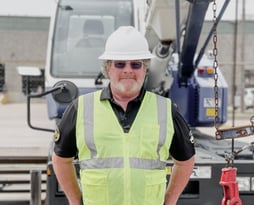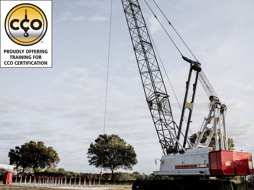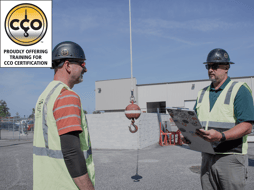
Crane Supervisor Training
Cutting-Edge Management Training to Drive Success from the Frontlines.
Crane Supervisor Safety Awareness Courses
What Managers Must Know When Leading Crane & Rigging Operations:
Frontline supervisors play a crucial role in maintaining crane and rigging safety. They oversee the work of the teams they manage, and their knowledge and expertise directly impact the safety and success of their projects.
Supervisors and managers involved with lifting should be familiar with:
- The roles and responsibilities involved in lifting operations
- The difference between qualification and certification
- Selection of crane type and rigging hardware
- Site preparation and planning
- Inspection and maintenance schedules
- Regulatory requirements affecting their operation
Safety training helps managers better understand these concepts and the capabilities and limitations of the crews and equipment they manage. They then emphasize these safe work practices to their employees, boost operational efficiency, and increase workplace morale.
The Costs of Untrained Management
Safety-trained management is less likely to pressure their team to engage in unsafe practices. “On many accident investigations, it turns out operators knew what they were doing was unsafe, but they did it anyway because management pressured them to.” Trent Burns, a senior instructor and inspector at CICB, explains. “I personally had to leave a previous job because my supervisor asked me to operate the crane in a way that I knew was unsafe. A trained supervisor would know better because they would understand the consequences of their request.”
CICB Crane & Rigging Safety Awareness Courses:
Crane & rigging safety awareness training is a must for anyone managing teams using cranes. This training teaches managers how to read load charts, calculate capacities, verify proper crane setup, and spot common hazards. It helps managers understand how to order the right equipment for the right job and verify that the staff is qualified for the equipment they will operate.
Management must know when an operator is qualified to operate a crane. For example, an operator may be assessed as qualified to operate a swing-cab boom-truck crane on H-frame outriggers, but that doesn’t mean they are qualified to run a fixed-cab boom-truck crane on A-frame outriggers. Supervisors need to know these differences.
“I’ve seen a scenario where a highly experienced crew operated a carry-deck crane for over 15 years.” Trent Burns says. “The crane was down for maintenance, and not knowing the difference, management ordered them a rough-terrain swing-cab crane. The crane was damaged the first day.” Assigning personnel to operate cranes they are not qualified to run can cause project delays and create a hazardous environment.
Workplace Synergy
Safety awareness trained leadership boosts morale for managers and frontline employees. Supervisors experience increased confidence from having a deeper understanding of the processes and equipment they are responsible for.
Elevate your Supervisors’ Expertise with CICB
Every lifting project can have unique challenges. Safety-awareness-trained management will be better prepared to handle what these projects can throw at them. CICB offers crane supervisor courses to help companies drive safety and success at their frontlines. Contact us for availability.


“I took the one-week Crane Operator course at Orlando. The program was run very well ... As I run the crane today, I still think about things he showed me in the training. I would recommend this course to anyone.”
Tom C. - Local 7 Plumbers and Steamfitters
Partner with the Industry Leader
Why CICB?
-

CCO Commissioner

John O'Connor is CICB's Houston Office General Manager and Career School Director and serves as an NCCCO Commissioner
-

CCO Certified

CICB's instructors are CCO certified in the subject matters they teach and accredited as CCO Practical Examiners.
-

CCO Spanish Developer

CICB has partnered exclusively with the NCCCO since 2003. We were a major contributor in the development of Spanish testing during the pilot program phase.


